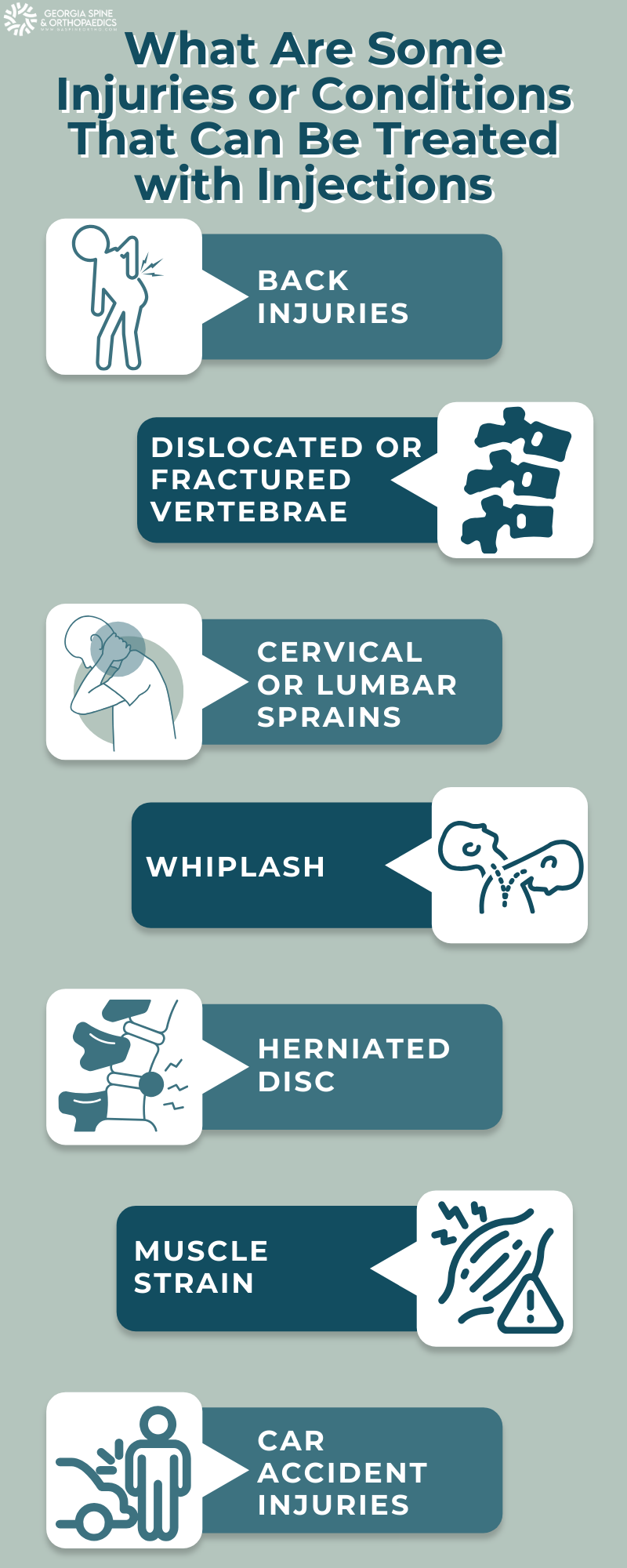Chronic pain is unrelenting and unpredictable. You might have good days, but when the pain comes, there is no indication that things are getting better. Living without knowing when the pain will rear its ugly head can be very frustrating, to say the least. Fortunately, the social Atlanta medical injections from Georgia Spine & Orthopaedics can help.
Pain management injections are a minimally invasive solution that provides effective and lasting pain relief. If you are suffering from chronic pain caused by various injuries or conditions, Georgia Spine & Orthopaedics can help you get the relief you so desperately need. Call 678-929-4494 today, to speak to one of our specialists or book a consultation.
How Are Medical Injections Used in Pain Management?
Pain relief injections contain different types of medications. Most injections come with a steroid, like cortisone, a local anesthetic, or a combination of both.
Injections that contain a steroid are usually used to provide long-term relief from pain and inflammation. Epidural steroidal injections are commonly used to relieve lower back pain – they can also help with neck and upper back pain as well. These injections, introduce the medication into the epidural space around the spinal cord to provide the necessary relief.
Another commonly used variation of pain relief injections is nerve blocks. These are used to relieve acute pain by interrupting nerve signals that would otherwise register as pain when they reach the brain. While they are usually used to manage pain associated with inflamed nerves, nerve blocks can also help with pinpointing the source of the discomfort.
These injections are normally administered through a quick and simple procedure. After cleaning the area to be injected, a medical specialist will administer a local anesthetic, and then use an X-ray and a test dye to identify the exact site where the medication is to be delivered. Lastly, the specialist will inject the medication and cover the site with a small bandage.
Patients can expect their pain to subside soon afterward – as the pain medication takes effect. It is worth noting that the number of injections needed to provide long-term relief varies from one individual to the next.
What Are Some Injuries or Conditions That Can Be Treated with Injections?
Pain management injections can be used to treat just about any condition or injury that causes chronic pain. Common injuries that can be treated using this approach include:
- Back Injuries caused by repetitive movements, heavy lifting, sports accidents, twisting your back, or falls
- Dislocated or Fractured Vertebrae
- Cervical or Lumbar Sprains
- Whiplash
- Herniated Disc
- Muscle Strain
- Car Accident Injuries etc.
These injections can also be used to treat a variety of conditions including:
- Osteoarthritis: Over time, the cartilage that surrounds the ends of bones breaks down causing this condition (osteoarthritis). While it mostly affects joints in the spine, hips, knees, and hands, osteoarthritis can damage just about any joint in the body.
- Radiculopathy: Various degenerative changes, injuries, and inflammation of soft tissue can lead to radiculopathy. This condition refers to the occurrence of painful pinched nerves.
- Degenerative Discs: The natural aging process causes spinal discs to lose their strength and dry out – leading to a weakened disc that can be more easily injured than a healthy disc.
- Spinal Stenosis: Bone spurs, herniated discs, and thickening ligaments can cause spinal stenosis. This can result in the narrowing of the spinal canal – exerting pressure on the nerves therein.
Available Medical Injections at Georgia Spine & Orthopaedics
Spinal Injections:
Radiofrequency Ablation (RFA)
Normally used to manage chronic pain experienced in arthritic joints, the lower back, and the neck, RFA relies on the use of heat to destroy tissue. To heat a part of the affected nerve, radio waves are sent through a strategically placed needle. The destruction of the nerve prevents it from sending pain signals to the brain.
Radiofrequency ablation can be used to treat pain that is not responding to other treatments – like physical therapy and pain medication. It can also be used on people who have had a successful nerve block injection – as the problematic nerve has been identified.
Cervical Medial Branch Block injections
These injections are used to treat facet joint pain (which may lead to referred shoulder pain, headaches linked to neck joints, and neck pain). To block the transfer of pain signals to the brain, this injection delivers a local anesthetic into the area outside the joint in question, close to the nerves (medial branch nerves).
This procedure can provide long-term pain relief. It can also be used to predict the success of radio frequency ablations of the affected branch nerves.
Cervical Epidural Injections
This procedure is normally used to provide temporary relief from chronic pain caused by inflammation and irritation of spinal nerve roots in the neck – which can lead to different types of chronic neck pain. Spinal nerve root irritation can be caused by cervical spinal stenosis, degenerative disk disease, herniated disk, and osteoarthritis. To provide pain relief, an anti-inflammatory medication is injected into the epidural space of the neck.
Thoracic Facet Joint Injections
Facet joints are tiny joints found between vertebral bones along the spine – including the upper back (thorax). These joints can be affected by arthritis, mechanical stress, and injury – leading to chronic pain in the chest, mid-back, and in some cases the arms.
Thoracic Facet Joint Injections help relieve pain associated with the facet joints in this part of the body (mid to upper back). The injections feature a mixture of local anesthesia and corticosteroids.
Thoracic Epidural Injections
These shots are normally used to provide temporary pain relief, making it possible for patients to engage in physical therapy, or even eliminating the need for surgery. The injected medication treats pain in the thoracic region (mid to upper part) of the back. The medicine is delivered into the epidural space – the area surrounding your spinal cord.
This procedure can help relieve pain associated with spinal stenosis, injuries that irritate nerves in the spine, thoracic post-surgical spine syndrome, and disc herniation that causes pain in the arm and back.
Lumbar Facet Joint Injections
Lumbar facet joints are found in the lower back. They allow bones in this part of the body to rotate. Arthritis and facet arthropathy are some of the causes of pain in these joints.
Also referred to as a lumbar facet joint block, these injections introduce a numbing medication (local anesthetic) into the affected area – the tiny joints next to the vertebral bones close to the spine. The number of injections required to provide relief depends on the number of joints affected.
Lumbar Transforaminal Epidural Injections
You may be suffering from dural or lumbar disc inflammation if you experience lower back pain whenever you bend. If the pain moves down your legs, this may point to the inflammation of nerve roots.
This procedure injects steroids into the epidural space surrounding the spine at the lower back. To make sure that the medication is as close to the source of the inflammation as possible, the injection is done on the side where the nerve exits the spine.
Sacroiliac Joint Injections
The joint that links your pelvis to your spine is referred to as the sacroiliac joint. There are two sacroiliac joints – one on either side of the body. These joints can cause pain in your hip, buttock, or lower back.
This procedure is used to ease pain by injecting medication directly into the joint. It can also help with diagnosing the cause of back pain.
Spine Platelet Rich Plasma (PRP) Injections
Unlike the other procedures described above, PRP injections do not use any medication to relieve pain. To decrease inflammation and enhance the rate of healing, these shots deliver a concentrated dose of platelets and plasma into the affected section of the spine. The platelets used are obtained from blood drawn from the patient in need of pain relief.
In addition to providing longer-lasting results, PRP injections are considered to be safer for continuous use and come with fewer side effects and risks than steroids.
Joint Injections:
Joint Platelet Rich Plasma (PRP) Injections
These injections use the patient’s blood to facilitate faster healing of the affected joint(s). This is thanks to the significantly higher concentration of growth factors in platelet-rich plasma. Clinicians use a centrifuge to obtain platelet-rich plasma from a sample of blood from the patient. The plasma is then injected into the affected site – such as an injured tendon or joint.
If you have suffered a joint injury, this procedure can help support healing and provide pain relief. When used to treat joint injuries, results can be seen in a matter of weeks. These injections are considered to be safer than popular pain medications like corticosteroids.
Joint Steroid Injections
You may benefit from a steroid shot if you are experiencing chronic joint pain associated with inflammation. These injections contain a numbing agent and a corticosteroid. When administered directly into the affected area, these injections can significantly reduce inflammation and provide pain relief for days, months, or even years. The shot is delivered into the joint capsule of the painful joint.
These injections can be used to treat joint pain associated with degeneration, injury, or arthritis. Possible injection sites include knee, shoulder, hip, sacroiliac, and facet joints among others.
Enjoy Effective Pain Relief Today!
Chronic pain can have a huge impact on your quality of life. If you are tired of trying ineffective pain relief methods, consider getting Atlanta medical injections. Call 678-929-4494 to speak to one of the friendly and knowledgeable pain relief experts or to schedule an appointment at Georgia Spine & Orthopaedics.







